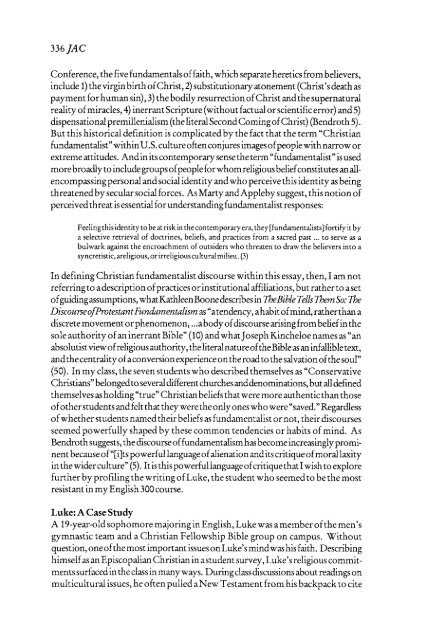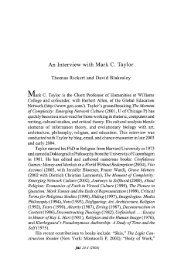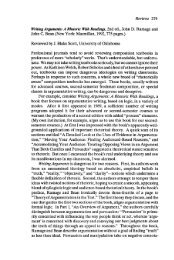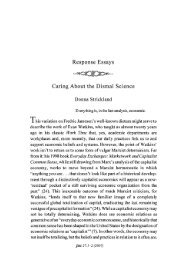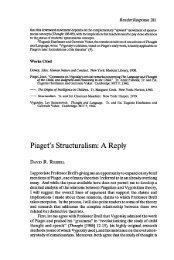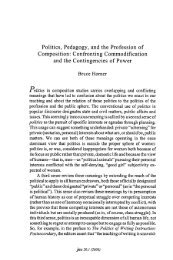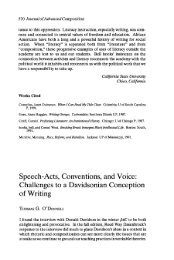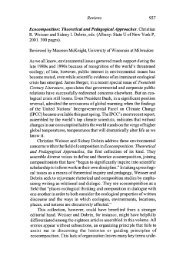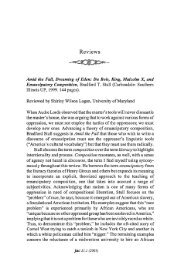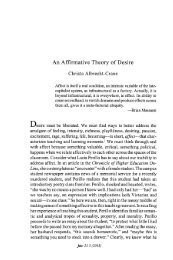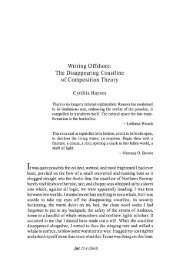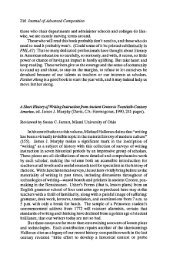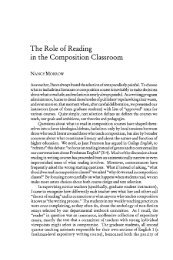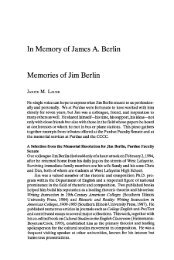It's aQuestion ofFaith: Discourses of Fundamentalism ... - JAC Online
It's aQuestion ofFaith: Discourses of Fundamentalism ... - JAC Online
It's aQuestion ofFaith: Discourses of Fundamentalism ... - JAC Online
You also want an ePaper? Increase the reach of your titles
YUMPU automatically turns print PDFs into web optimized ePapers that Google loves.
336]AC<br />
Conference, the fivefundamentals <strong>of</strong>faith, which separatehereticsfrom believers,<br />
include 1)the virgin birth <strong>of</strong>Christ, 2)substitutionary atonement (Christ's death as<br />
payment for human sin),3)the bodily resurrection <strong>of</strong> Christ and the supernatural<br />
reality <strong>of</strong> miracles,4)inerrant Scripture (without factualor scientificerror) and 5)<br />
dispensational premillenialism (theliteralSecondComing <strong>of</strong> Christ) (Bendroth 5).<br />
But this historical definition iscomplicated by the fact that the term "Christian<br />
fundamentalist"within U.S.culture <strong>of</strong>tenconjuresimages<strong>of</strong>peoplewith narrow or<br />
extreme attitudes. And in itscontemporary sensethe term "fundamentalist"isused<br />
more broadly to includegroups<strong>of</strong>peopleforwhom religiousbeliefconstitutesanallencompassing<br />
personal and socialidentity and who perceivethis identity asbeing<br />
threatened by secularsocialforces. AsMarty and Appleby suggest,this notion <strong>of</strong><br />
perceivedthreat isessentialfor understanding fundamentalist responses:<br />
Feeling this identity to be at risk in the contemporary era, they [fundamentalists] fortify it by<br />
a selective retrieval <strong>of</strong> doctrines, beliefs, and practices from a sacred past ... to serve as a<br />
bulwark against the encroachment <strong>of</strong> outsiders who threaten to draw the believers into a<br />
syncretistic, areligious, or irreligious cultural milieu. (3)<br />
In defining Christian fundamentalist discourse within this essay,then, I am not<br />
referring to adescription <strong>of</strong> practices0 r institutio nalaffiliations,but rather to aset<br />
<strong>of</strong>guidingassumptions,whatKathleenBoonedescribesinTheBibleTells1bemSo:The<br />
Discourse<strong>of</strong>Protestant<strong>Fundamentalism</strong>as"atendency, ahabit <strong>of</strong>mind, rather than a<br />
discretemovement or phenomenon, ...abody <strong>of</strong>discoursearisingfrom beliefinthe<br />
sole authority <strong>of</strong> an inerrant Bible" (10)and what Joseph Kincheloe names as"an<br />
absolutistview<strong>of</strong>religiousauthority, theliteralnature<strong>of</strong>theBibleasaninfallibletext,<br />
andthe centrality <strong>of</strong>aconversionexperienceon the road to the salvation<strong>of</strong>the soul"<br />
(50).In my class,the seven students who described themselves as"Conservative<br />
Christians"belongedto severaldifferentchurchesanddenominations,but alldefined<br />
themselvesasholding "true" Christian beliefsthat were more authentic than those<br />
<strong>of</strong>other students and feltthat they werethe only oneswho were "saved."Regardless<br />
<strong>of</strong> whether students named their beliefsasfundamentalist or not, their discourses<br />
seemed powerfully shaped by these common tendencies or habits <strong>of</strong> mind. As<br />
Bendroth suggests,the discourse<strong>of</strong>fundamentalismhasbecomeincreasinglyprominent<br />
because<strong>of</strong>"[i]ts powerful language<strong>of</strong>alienationanditscritique <strong>of</strong>moral laxity<br />
in the wider culture" (5).It isthis powerful language<strong>of</strong>critiquethat I wishto explore<br />
further by pr<strong>of</strong>iling the writing <strong>of</strong> Luke, the student who seemedto bethe most<br />
resistant in my English 300course.<br />
Luke: A Case Study<br />
A 19-year-oldsophomore majoring in English, Luke was amember <strong>of</strong> the men's<br />
gymnastic team and a Christian Fellowship Bible group on campus. Without<br />
question, one <strong>of</strong>the most important issueson Luke's mind washisfaith. Describing<br />
himself asan Episcopalian Christian in astudent survey, Luke's religiouscommitments<br />
surfacedin the classin many ways. During classdiscussionsabout readingson<br />
multicultural issues,he <strong>of</strong>ten pulled aNew Testament from his backpack to cite


